Podcasts - Disarmament Today
Disarmament Today is a series of podcasts about present-day disarmament issues, produced by the Office for Disarmament Affairs. It features guests from wide-ranging backgrounds in the area of international peace and security, who share their own expert views and experiences.

After the Summit of the Future: New Momentum for Arms Control and Disarmament?
On 8 October 2024, the UNODA Vienna Office, in partnership with the Diplomatic Academy of Vienna and the Austrian Research Association, organized a Vienna Conversation Series (VCS) on key dynamics emanating from the Summit of the Future process and newly-agreed Pact for the Future, their possible implications for disarmament and arms control processes, and the role of different stakeholders in advancing disarmament-related actions.
The event, held at the premises of the Diplomatic Academy of Vienna, featured speakers from international organizations, academia and think tanks, as well as a youth representative. They reflected on the Pact’s relevance in the global environment surrounding arms control and disarmament and the Pact’s possible implications for future multilateral efforts in the field.
Listen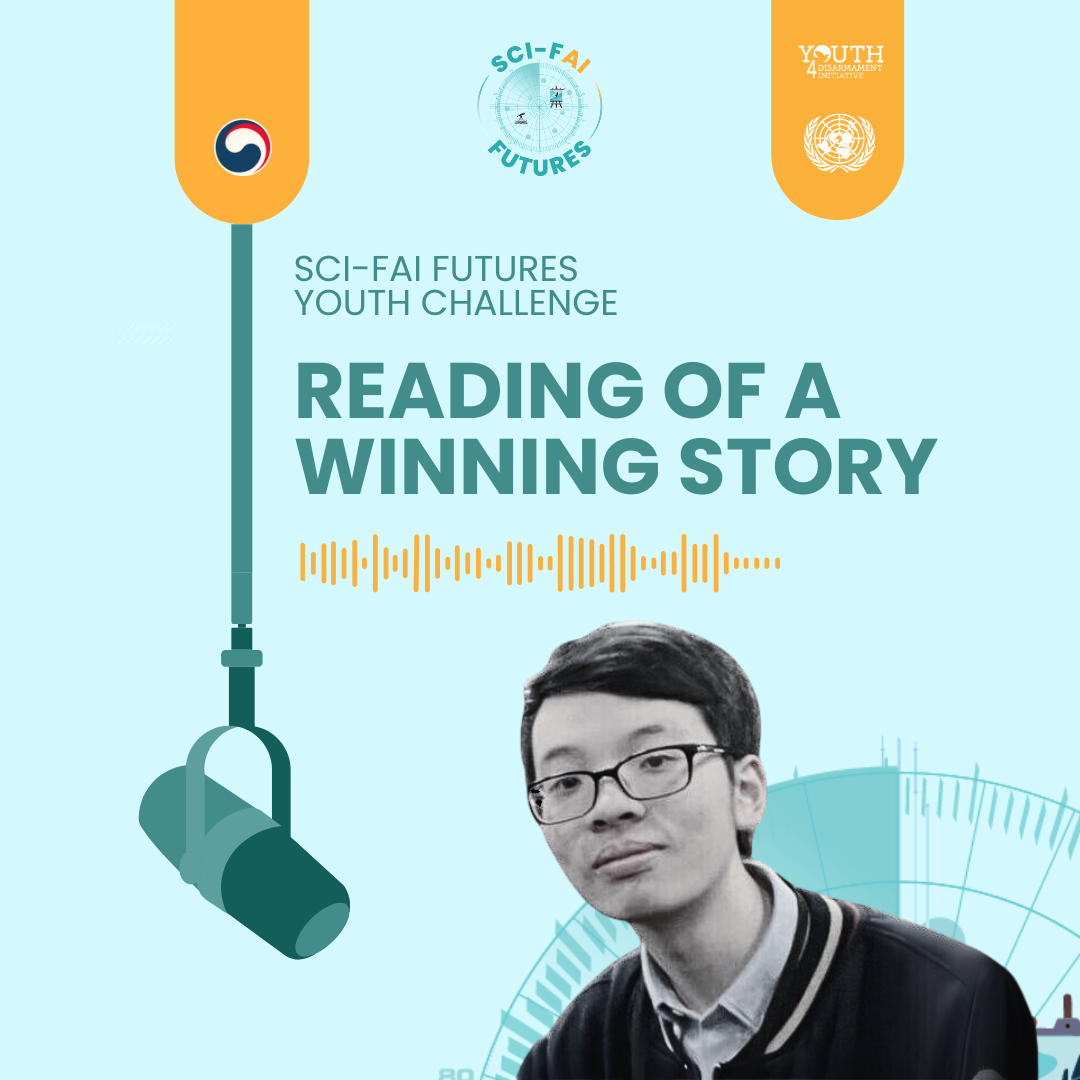
Sci-fAI Futures story - “The Interviewee, the Email, and the Three-Hour War”
From catalysing a new Industrial Revolution to threatening human extinction, artificial intelligence has been a recurrent theme in science fiction. Alternatingly a remedy for all ills and a harbinger of a gloomy future, rapid developments in AI have fuelled a sense of urgency within the international community, resolute to harness its promises and mitigate its risks. Embracing the centrality of storytelling in navigating innovation and thanks to the generous financial support from the Government of the Republic of Korea, the Office for Disarmament Affairs launched the “Sci-fAI Futures” Youth Challenge to spark young people’s interest and imagination on how AI can affect international peace and security, particularly in the military domain.
In this podcast, we listen to first prize winner, Jord Nguyen, read his story, set in two different eras. Entitled “The Interviewee, the Email, and the Three-Hour War”, it imagines one possible scenario, demonstrating the dangerous capabilities of AI models and warning about neglected governance.
Listen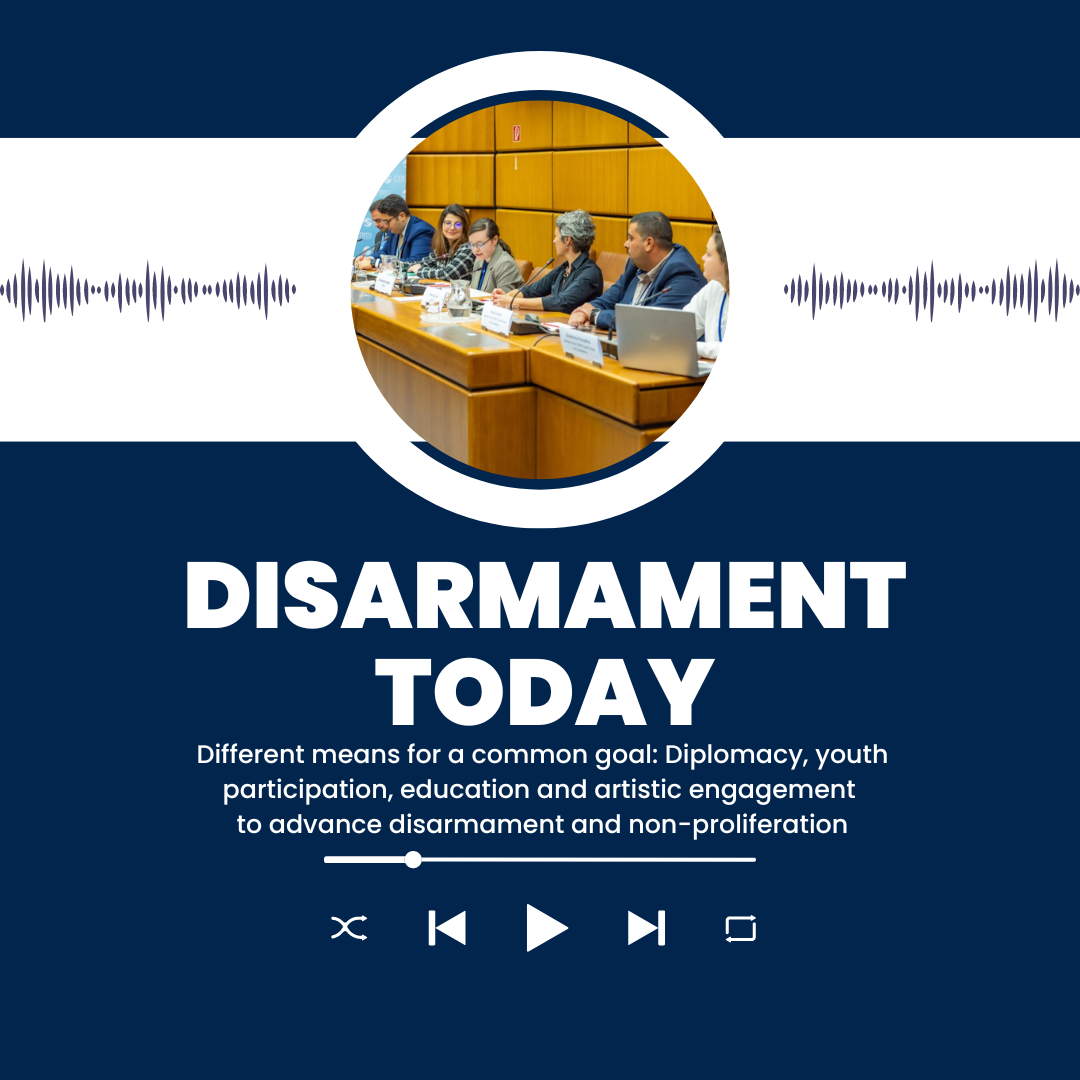
Different means for a common goal: Diplomacy, youth participation, education and artistic engagement to advance disarmament and non-proliferation
On 12 June 2024, UNODA Vienna Office organized another Vienna Conversation Series (VCS) Event on “Different means for a common goal: Diplomacy, youth participation, education and artistic engagement to advance disarmament and non-proliferation”. The event brought together participants from capacity-building programmes and creative initiatives conducted across the broader disarmament and non-proliferation community to foster constructive dialogue with alumni and inter-generational members. Throughout the interactive discussion, the role of education as a tool to inform people about disarmament and the role of art as a catalyst to inspire action were recognised. The event provided a timely reflection on the impact of diverse educational initiatives in engaging and empowering various audience groups.
Former and current participants of the UN Disarmament Fellowship programme engaged in the discussion, together with the winner of the Preparative Commission for the Comprehensive Nuclear-Test-Ban Treaty Organization (CTBTO) Youth Group Art Competition, and other members of the CTBTO Youth Group Task Force and the United Nations Office for Disarmament Affairs (UNODA).
Listen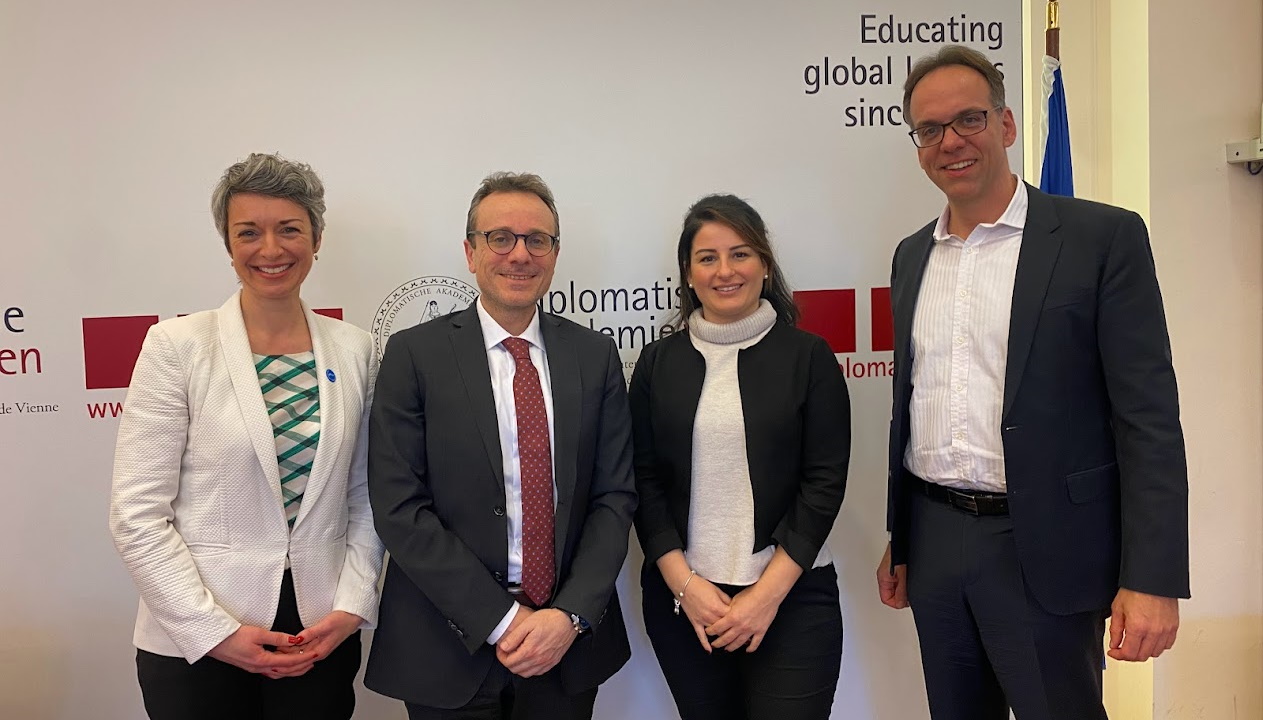
Reducing the human cost of weapons: human-centred disarmament through a gender lens
On 15 March 2024, the UNODA Vienna Office, in partnership with the Diplomatic Academy of Vienna, the Austrian Research Association, and the Permanent Mission of the Kyrgyz Republic to the United Nations in Vienna, organized another Vienna Conversation Series (VCS) event. Aimed at celebrating the International Day for Disarmament and Non-Proliferation Awareness on March 5, and International Women’s Day on March 8, this edition of the VCS, entitled “Reducing the human cost of weapons: human-centred disarmament through a gender lens”, shed light on the human cost of conventional weapons focusing on gender-based violence, gender mainstreaming, and human-centred approaches to disarmament.
The event, held at the premises of the Diplomatic Academy of Vienna, featured several high-level speakers from international organizations, academia and think tanks. They drew attention to the alarming issue that the widespread availability, diversion, and misuse of small arms and light weapons fuel armed violence and conflict, including gender-based violence. Additionally, the panellists discussed the varying gendered impacts of weapons, armed conflict, and security. The fruitful exchange underscored the necessity of adopting a gender lens to formulate and implement better and more effective policies and programmes, and ensuring women’s participation and leadership in disarmament processes with the ultimate goal of reducing the human cost of weapons and arriving at more inclusive and sustainable solutions.
Listen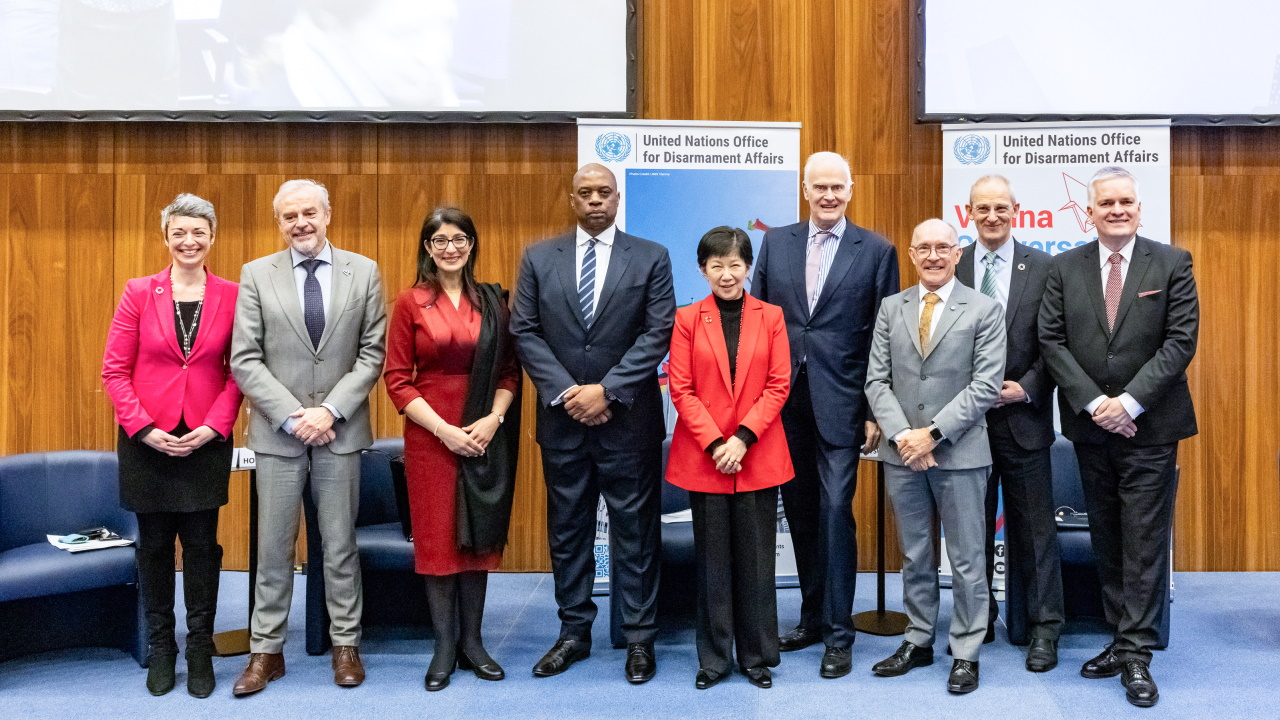
Non-proliferation, disarmament & global governance: The role of the Vienna community in the preparations for the Summit of the Future and beyond
On 30 January 2024, UNODA Vienna Office organized another Vienna Conversation Series (VCS) Event on “Non-proliferation, disarmament & global governance: The role of the Vienna Community in the preparations for the Summit of the Future and beyond”. The event aimed at raising awareness of the Summit of the Future, to be held on 22 and 23 September 2024 in New York. Specifically, the Summit seeks to accelerate efforts to meet our existing international commitments and take concrete steps to respond to emerging challenges and opportunities, to be achieved through an action-oriented Pact for the Future, to be agreed by Member States. The VCS Event was held at a timely moment, with the zero draft of the Pact for the Future having been released only a few days before on 26 January.
The high-level speakers, including the High Representative for Disarmament Affairs, Ms. Izumi Nakamitsu, senior representatives from Vienna-based organizations and the Pact’s co-facilitators - Germany and Namibia – underscored how much the Vienna community can contribute, with relevant expertise and experience, including in the areas of international peace and security as well as sustainable development.
Listen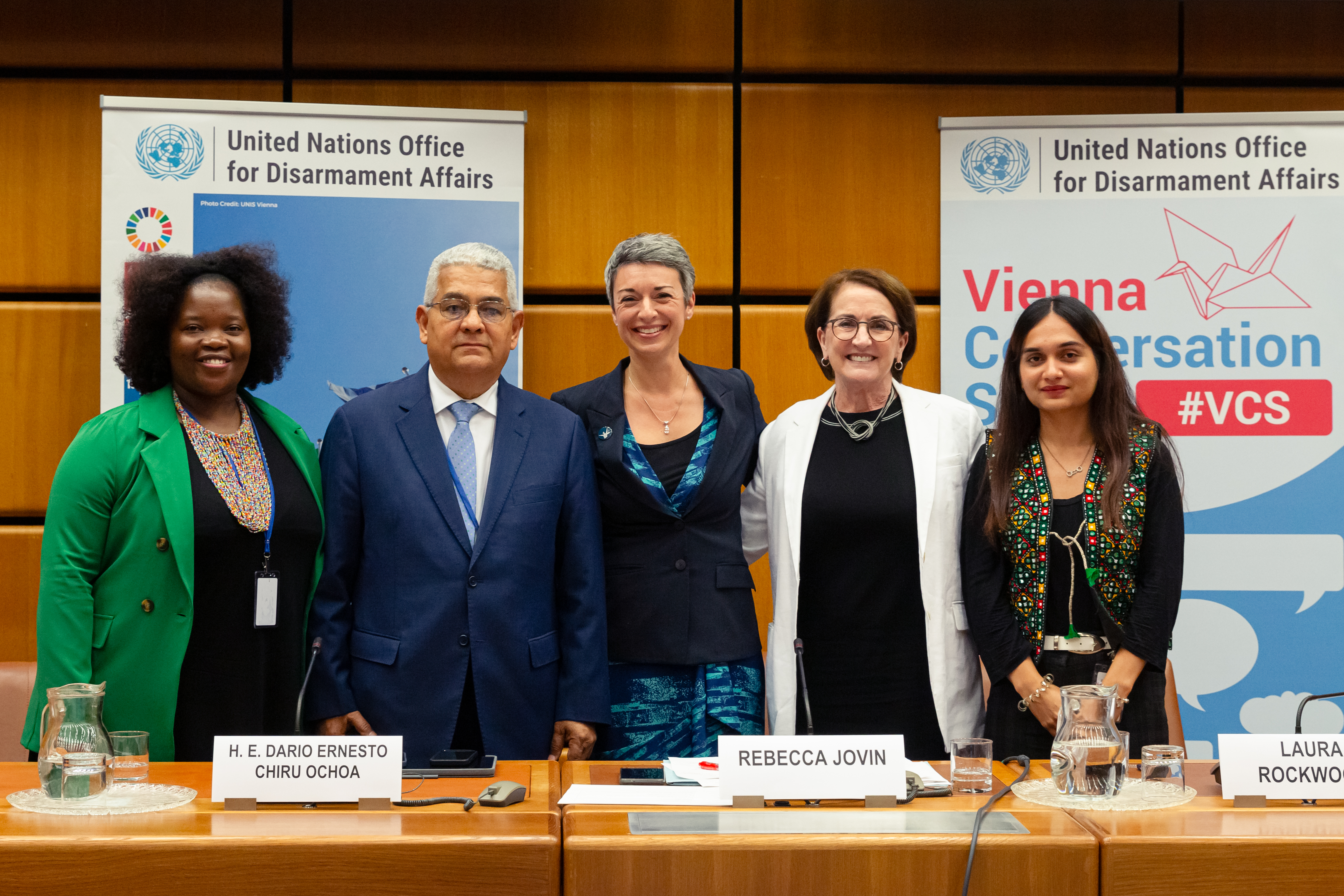
Bridging the divide: The role of networks in advancing inclusive disarmament processes
On 6 September 2023, UNODA Vienna Office hosted a hybrid event on the topic of "Bridging the divide: The role of networks in advancing inclusive disarmament processes." This interactive roundtable event aimed at showcasing the value of integrating diverse perspectives in disarmament discourse and decision-making processes, providing concrete examples and success stories, as well as exploring opportunities for strengthening of interdisciplinary, inter-generational, and cross-regional networks.
Panellists explored strategies and best practices for fostering the adoption of an inclusive approach, including intergenerational dialogue, networks and alumni groups, and multistakeholder consultations.
Listen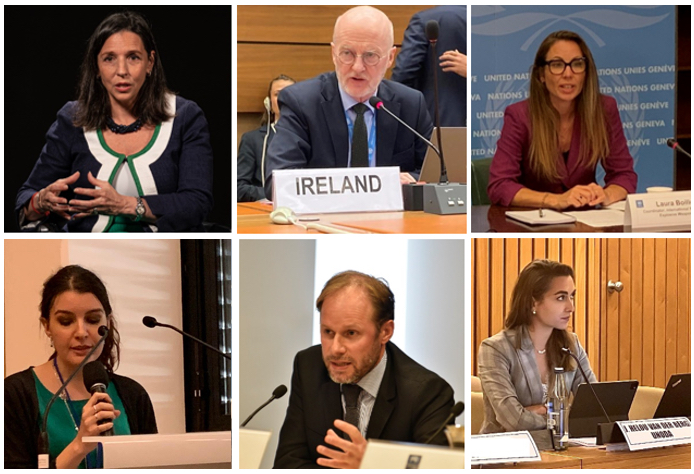
Explosive Weapons In Populated Areas
18 November 2022 marked a milestone in collective efforts to better protect civilians from the increasing urbanization of armed conflict. That day, States came together in Dublin, Ireland, to endorse and support the political declaration on strengthening the protection of civilians and the humanitarian consequences arising from the use of explosive weapons in populated areas (EWIPA).
Over the past few years, civilians accounted for 90% of victims when explosive weapons were used in populated areas. Civilian suffering includes not only death and injury, but reverberating effects that cause long-lasting harm and psychological trauma.
This podcast explains how the international community – States, international organisations, and civil society – build the momentum to tackle this issue. Hear from those who were part of the process about why the Political Declaration matters, what its key components are, how practical and good faith implementation of the declaration can make a difference for people living in conflict-affected areas, and how young people can get involved.
With: • Juliana Helou van der Berg, Political Affairs Officer of the United Nations Office for Disarmament Affairs (UNODA) Geneva Branch (Moderator) • Mélanie Régimbal, Chief of Service of the UN Office for Disarmament in Geneva • Noel White, Permanent Representative of Ireland to the United Nations Office at Geneva • Laura Boillot, Programme Manager for Article 36 and coordinator of the International Network on Explosive Weapons – INEW • Dr. Eirini Giorgou, Legal adviser in International Committee of the Red Cross’ Arms and Conduct of Hostilities Unit • Aurélien Buffler, Chief of the Policy Advice and Planning Section of the UN Office for the Coordination of Humanitarian Affairs (OCHA)
Listen to the full episode here : Listen
Or, click below for shorter thematic episodes:
1. Explosive weapons in populated areas 101: what are explosive weapons and why does their use in populated areas cause such humanitarian harm?
Listen
2. Lookback – the long road to the endorsement of the EWIPA Political Declaration
Listen
3. What is in the Political Declaration and what does it hope to achieve?
Listen
4. And now…what happens next? How to make the implementation of the Declaration a success? How can young people get involved?
Listen
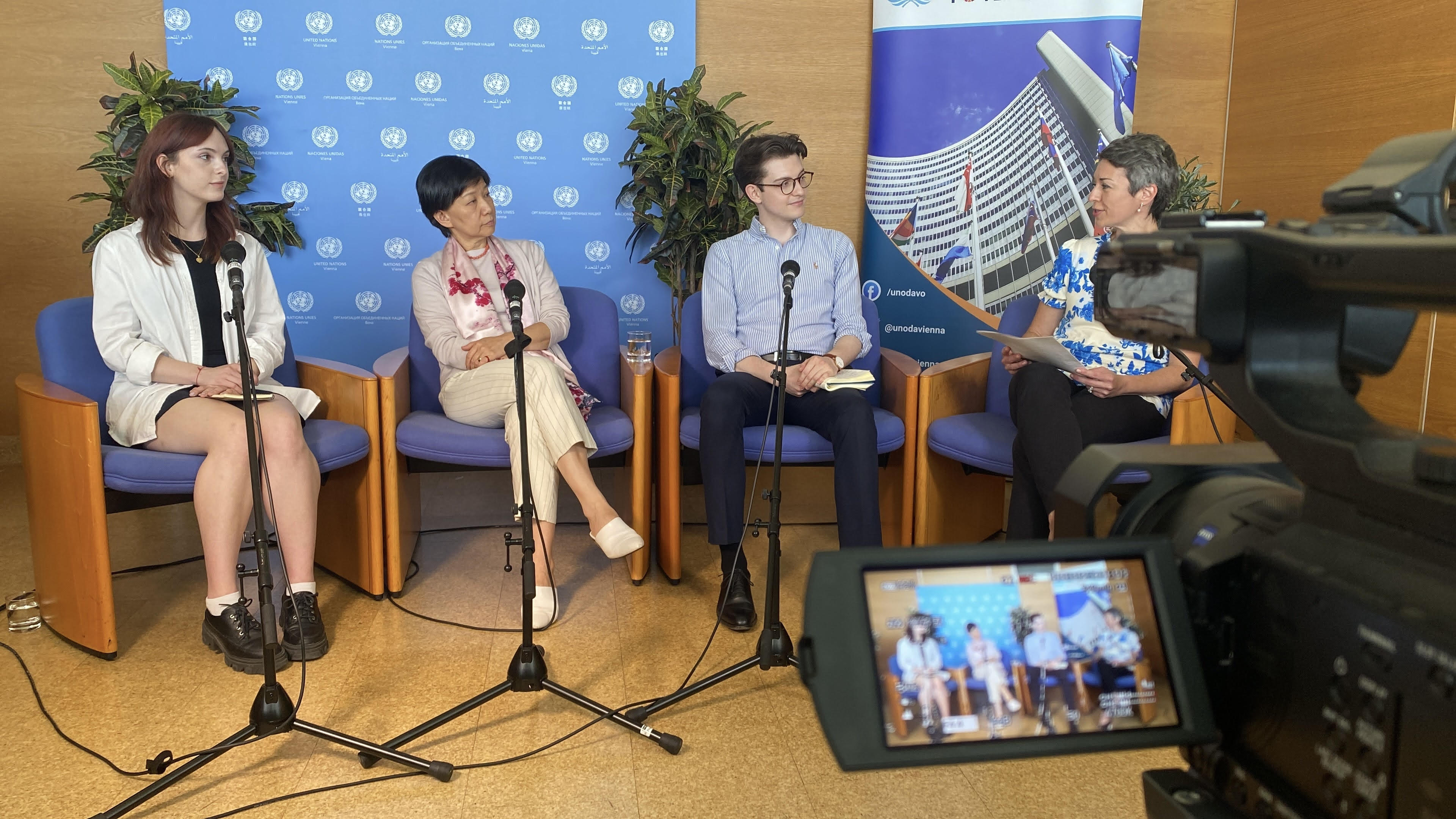
Where next for youth in disarmament?
This latest podcast to feature on Disarmament Today is part of a roundtable-style Vienna Conversation Series, aimed at engaging youth to raise awareness of disarmament’s centrality in addressing global challenges and to amplify fresh thinking. In a dynamic exchange of views with High Representative for Disarmament Affairs Izumi Nakamitsu, youth representatives Kasha Sequoia Slavner and Louis Reitmann share their thoughts on ways to educate, engage and empower young people in the disarmament field.
Kasha Sequoia Slavner is a GenZ multi-award-winning documentary filmmaker. Louis Reitmann works as a Research Associate at UNODA’s partner organisation, the Vienna Center for Disarmament and Non-Proliferation, where he focuses on export controls and sanctions implementation.
Both Kasha and Louis are currently participating in the #Leaders4Tomorrow workshop series organised by ODA´s #Youth4Disarmament initiative.
Listen
An interview with Jok Abraham Thon and Gail Prensky Changing minds from "bullets to books"
This podcast is being released during the annual 16 Days of Activism Against Gender-Based Violence Campaign. This year’s theme is “Be the Change”, aiming to inspire people to make a difference in their communities.
Ms. Soo Hyun Kim, a Political Affairs Officer leading Youth for Disarmament Initiative in the United Nations Office for Disarmament Affairs (UNODA) is joined by two special guests Jok Abraham Thon from South Sudan and Gail Prensky from Washington D.C. sharing their stories of making an impact in the world by changing minds from “bullets to books”.
Jok is a member of the #Youth4Disarmament Initiative and the founder and director of the Promised Land Primary & Secondary school in Juba, South Sudan. He founded the school at age 26 with an aim to build peace and unity through education in South Sudan. Since its establishment in 2016, 700 students who have been affected by conflict have graduated and 420 of those have gone on to University.
Gail Prensky is a creator, executive producer, and director of The Jüdische Kulturbund Project. Gail brings to this project a deep and first-hand understanding of the Kulturbund’s spirit and recognizes that their issues of living under oppression continue with artists around the world today. Her hope and dream is that the project will serve as a beacon of inspiration to all people.
For more about UNODA’s #Youth4Disarmament initiative, visit the dedicated website here.
Listen
Youth leaders discuss how young people can act as “ultimate forces for change” in disarmament
We are celebrating and commemorating a range of milestones that have both advanced the role of young people in disarmament, and opened opportunities for the youth to make meaningful contributions within the field.
Ms. Marykate Monaghan, an intern with the United Nations Office for Disarmament Affairs (UNODA), talks to five youth leaders from a range of different projects and initiatives, working with other young people to act as “the ultimate force for change.” They discuss the steps that they are taking to contribute to disarmament around the globe, and tips, suggestions, and resources for interested listeners to get involved themselves.
Guest speaker Ms. Su-Yin Lew from Australia is an advocate for nuclear disarmament and feminist foreign policy, who recently completed an internship with UNODA. Guests Ms. Kirsten Mosey from Canada and Ms. Palesa Mogorosi from South Africa are two of the ten Youth Champions for Disarmament, participating in an innovative learning programme, organised by UNODA’s #Youth4Disarmament initiative and funded by the Government of Germany, aimed at empowering them to work for disarmament in their communities. Finally, Ms. Khishigjargal (Khishi) Enkhbayar from Mongolia and Ms. Moe Sasaki from Japan are part of the Steering Committee of young leaders in Northeast Asia, brought together by UNODA and the UN Department of Political and Peacebuilding Affairs (UNDPPA) to design and co-facilitate a youth and disarmament workshop.
For more about UNODA’s #Youth4Disarmament initiative, visit the dedicated website here.
Listen
A conversation with the High Representative for Disarmament Affairs on International Women’s Day 2020
Ms. Izumi Nakamitsu is the Under-Secretary-General and High Representative for Disarmament Affairs. As an International Gender Champion, she is highly committed to advancing the meaningful participation and inclusion of women in all disarmament decision-making processes.
In celebration of International Women’s Day, she speaks about the contribution of women in the field of disarmament and arms control. She highlights the need to build on past experiences with women’s involvement in such processes, from the 1963 Partial Test Ban Treaty to the 2017 Treaty on the Prohibition of Nuclear Weapons, and for Member States, civil society and the UN alike to recommit to advancing gender parity and effectively integrating diverse perspectives and gender dimensions in disarmament fora and discussions. She addresses the gendered impact of weapons, encourages gender mainstreaming in disarmament, a more reflected debate on cyber security, and provides advice for women working in the field of disarmament.
Ms. Nakamitsu assumed her position as Under-Secretary-General and High Representative for Disarmament Affairs on 1 May 2017.
Listen
A discussion on Nanotechnology with Dr. Jürgen Altmann
Dr Jürgen Altmann is a physicist and peace researcher who has worked since 1985 on scientific-technical problems of disarmament, in particular military-technology assessment and preventive arms control, one field being potential military applications of nanotechnology.
Dr Altmann is currently a Researcher and Lecturer at the Technical University of Dortmund, Physics and Disarmament Department.
His publications include:
- J. Altmann, Military Nanotechnology: Potential Applications and Preventive Arms Control, Abingdon/New York: Routledge, 2006
- J. Altmann, Nanotechnology and Preventive Arms Control, Forschung DSF No. 3, Osnabrück: Deutsche Stiftung Friedensforschung, 2005, (link to publication)
- J. Altmann, Preventing Hostile and Malevolent Use of Nanotechnology – Military Nanotechnology After 15 Years of the US National Nanotechnology Initiative, in M. Martellini, A. Malizia (eds.), Cyber and Chemical, Biological, Radiological, Nuclear, Explosives Challenges: Threats and Counter Efforts, Cham: Springer International, 2017

An interview with Ms. Shorna-Kay Richards on: GENDER and DISARMAMENT
Ms. Shorna-Kay Richards is the Deputy Permanent Representative of Jamaica to the United Nations in New York. She is a career diplomat and has been a member of the Jamaica Foreign Service since September 1994.
In her current assignment to the United Nations, she deals primarily with issues relating to disarmament and international security. As Jamaica's representative to the UN First Committee on Disarmament and Security and the Caribbean Community and Common Market (CARICOM) UN First Committee Coordinator for 2013, her experience includes participation in the Arms Trade Treaty negotiations; serving as Vice-Chair of the UN Disarmament Commission in 2013; and articulating CARICOM's position on international security and disarmament, as well as coordinating CARICOM's participation in the Fifth Biennial Meeting of States to consider the implementation of the UN Programme of Action on Small Arms and Light weapons. She also coordinated Jamaica's chairmanship of the First Committee during its 69th Session in 2014. She is now actively engaged in coordinating Jamaica's chairmanship of the Sixth Biennial Meeting of States scheduled for June 2016.
She was a United Nations fellow on disarmament in 2005.
Listen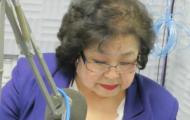
An interview with Ms. Setsuko Thurlow, Atomic Bomb Survivor and Special Communicator for a World Without Nuclear Weapons
Setsuko Thurlow has been appointed by the Government of Japan as a special communicator for a world without nuclear weapons. She was born and raised in Hiroshima and experienced the atomic bombing at the age of 13. She remembers vividly the 6th of August 1945, the day the atomic bomb was dropped on Hiroshima, and the hardships she and many survivors endured physically and mentally thereafter. Subsequent to the atomic bombing, she started attending a local Christian church in Hiroshima in the hope of finding meaning in her life. Professionally, she practiced social work in the USA and Canada.
As a survivor of the atomic bombing, she is strongly committed to tell the story of Hiroshima. Most survivors are getting old and many are passing away, leaving a smaller number of Hibakusha (atomic bomb survivors) to tell their stories. Ms. Thurlow feels it is imperative to tell the younger generations of that terrible day and its aftermath. This is one of the reasons why she joined a non-governmental organization called "Hibakusha Stories" which passes the legacy of the atomic bombings of Hiroshima and Nagasaki to a new generation, and empowers them with tools to build a world free of nuclear weapons.
She is married with two sons and two granddaughters and currently lives in Canada. She has devoted over 40 years of her life to nuclear disarmament. Photo Credit: Emilie McGlone, Peace Boat
Listen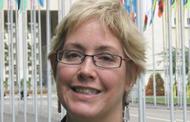
An interview with Ms. Theresa Hitchens on: SPACE SECURITY
Theresa Hitchens has been Director of UNIDIR since January 2009. Previously, she was director of the Center for Defense Information and led its Space Security Project, in cooperation with Secure World Foundation. The author of Future Security in Space: Charting a Cooperative Course, she has written on space and nuclear arms control issues for a number of journals and publications. She serves on the editorial board of the Bulletin of the Atomic Scientists. Theresa has had a long career in journalism, with a focus on military, defence industry and NATO affairs. She was Director of Research at the British American Security Information Council, a think tank based in Washington and London. Prior to that, she was with Defense News from 1988 to 2000, including five years as the newspaper's first Brussels bureau chief from 1989 to 1993, and as the Editor from 1998 to 2000. From 1983 to 1988, she worked at Inside Washington Publishers, covering issues from nuclear waste to electronic warfare and military space.
Listen
An interview with Dr. Kathleen Sullivan on: DISARMAMENT AND NON-PROLIFERATION EDUCATION
Kathleen Sullivan, PhD., is a disarmament educator and activist who has been engaged in nuclear issues for over 20 years. Currently, she is the Program Director for Hibakusha Stories, an arts based initiative that brings atomic bomb survivors into New York City High Schools to share their testimonies. She has been an education consultant to the United Nations Office for Disarmament Affairs in New York, and has produced 2 films about survivors from Nagasaki: The Last Atomic Bomb (2005) and The Ultimate Wish (coming soon).
Listen